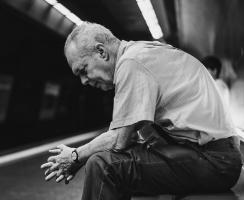Post-holiday depression: what is it and what are its effects?
Post-vacation depression is an example of the extent to which our emotional well-being is linked to our habits and routines.
And it is that once we have become accustomed to a way of life in which leisure and moments of relaxation prevail, “changing the chip” to enter our work role again can be hard.
In this article we'll see what exactly post-vacation depression is and how it affects us.
- Related article: "Emotional management: 10 keys to master your emotions"
What is post-vacation depression?
Post-vacation depression is an alteration of the mood that many people suffer at the end of their vacations, or when they see that they have very little time left to “disconnect” from work and soon they will have to return to the work routine.
It is an experience linked to emotional discomfort and that cannot be explained by medical complications or changes in the body. produced by the new routine when leaving vacations behind (going to sleep at other times, eating another kind of food and at different times of the day, etc.).
Post-vacation depression is generally considered not to be a serious mental health problem, and it goes away on its own after a few days to a couple of weeks.
This is so mainly because its main causes have to do with the change of routines and contexts to which the person is exposed daily; once some time has passed, the individual adapts again physically and psychologically to that daily life in which the work and professional are very present. This process of readjustment is usually unconscious and automatic, but sometimes it is necessary to take deliberate steps to accelerate it or even to have professional psychological support.

- You may be interested in: "The 6 differences between sadness and depression"
Effects of post-vacation depression
As we will see later, post-vacation depression does not become a psychological disorder, and this is partly because it isThe type of discomfort that it produces is not intense enough and with its own characteristics to delineate a clear psychopathology.
However, it has been seen that, in many people, a series of significant emotional alterations arise during the days after the end of the holiday (or even starting just before the period ends vacation). Among these alterations, the following stand out.
- Rumination related to melancholy: the person feels bad when recalling again and again the memories of what he lived on vacation and that he can no longer experience in the present.
- Indecision about time management: the person feels frustrated by having trouble organizing.
- Lack of motivation: difficulties arise in getting involved in day-to-day tasks once the holidays are over.
- Feelings of guilt: it is common for the person to feel guilty for not having made better use of their vacations.
To these phenomena of a psychological nature, a physiological alteration is usually added: altered biorhythms: as a consequence of the need to adopt a new schedule, many people feel sleepy when they have to give up and have trouble falling asleep after leaving to the bed. In combination with the above, the person's mood drops considerably.
- Related article: "The 6 types of mood disorders"
How is it different from clinical depression?
As I have anticipated, post-vacation depression does not belong to the group of what is technically considered a real depression, if we base ourselves on the criteria established in the diagnostic manuals of psychopathologies.
That is Although the term “post-vacation depression” describes a state of discomfort, it does not constitute a depressive disorder.
Although some of the symptoms may overlap and be present in both psychological phenomena, the clinical depression (also called "major depression") is a serious psychopathology that significantly damages the quality of life of those who have developed it and that lasts for months. In addition, in this type of mood disorder, there is a risk that the person feels so bad that he tries to end his life through suicide attempts.
In summary, the main symptoms of major depression are the following (although they do not have to occur all at once):
- General demotivation and inability to feel excited about any project.
- Tendency to social isolation in free time, even with the family.
- Complete or partial inability to feel pleasure.
- Tendency to catastrophic thoughts and feelings of hopelessness.
- Suicidal ideation.
- Constant fatigue
- Psychological rumination based on self-loathing and / or feelings of guilt.
- Trouble sleeping at the time it is due.
By comparison, post-vacation depression does not deplete mental health as much, much less lead to suicide attempts. Nevertheless, both problems may be reason enough to go to psychological therapy (In fact, in the case of clinical depression, it is imperative to seek professional help as soon as possible in all cases).
- You may be interested in: "Emotional upset: possible causes, and how to overcome it"
Are you looking for professional psychological support?
If you are going through difficult times and you are looking for a psychologist, I invite you to contact me.
My name is Tomás Santa Cecilia and I specialize in the cognitive-behavioral intervention model. I attend to individuals and companies both in person in my office in Madrid, and through online sessions by video call.
American Psychiatric Association (2014). DSM-5. Diagnostic and Statistical Manual of Mental Disorders. Madrid: Panamericana. World Health Organization. ICD 10. (1992). Tenth Revision of the International Classification of Diseases. Mental and Behavioral Disorders: Clinical Descriptions and Diagnostic Guidelines. Madrid: Meditor. Sarah D. Pressman, et. to the. (2009). Association of Enjoyable Leisure Activities With Psychological and Physical Well-Being. Psychosomatic Medicine, 71 (7): pp. 725 - 732. Tarumi, K.; Hagihara, A. & Morimoto, M. (1998). An investigation into the effects of vacations on the health status in male white-collar workers. Environmental Health and Preventive Medicine. 3(1): 23 - 30.


